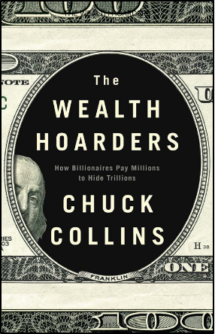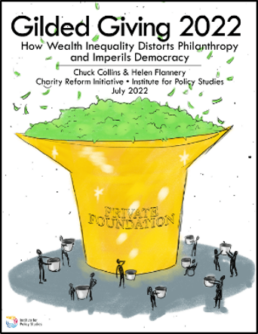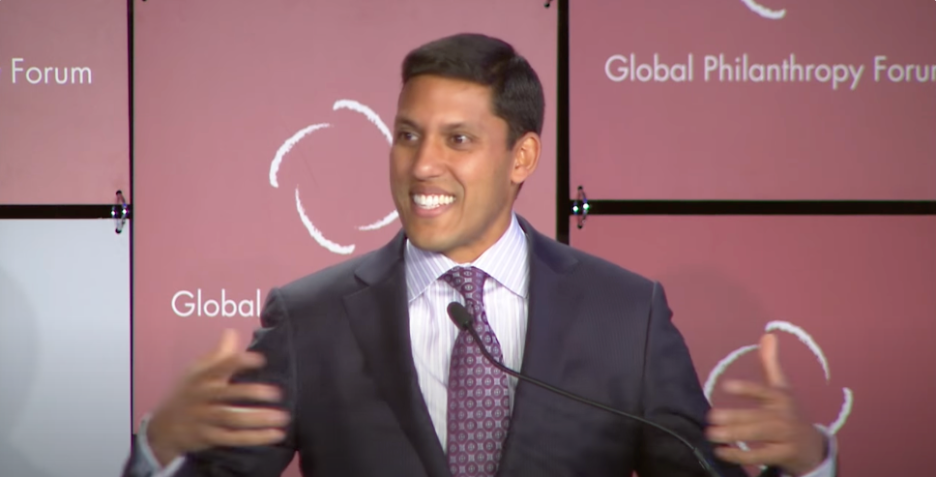The heir, author, and researcher talks to Craig Kennedy and Michael E. Hartmann about the “Wealth Defense Industry,” the degree to which philanthropy is used and charity is abused by the wealthy, and what could perhaps be done about it.
In 1983, when Chuck Collins was 23, he attended a conference for people with inherited wealth that was co-sponsored by a local family office and private foundation. The grandson of Oscar Mayer was going to inherit a substantial amount of money upon turning 25, as he tells it in his book The Wealth Hoarders: How Billionaires Pay Millions to Hide Trillions, and he was “finally coming to terms with this reality.”
As Collins went on to fully assess the reality of the world of wealth, including what it does in and through philanthropy, he gave all the money away instead. He now directs the Program on Inequality and the Common Good at the liberal Institute for Policy Studies (IPS) in Washington, D.C., and co-edits Inequality.org.
He is the author of several books, including 2003’s Wealth and Our Commonwealth: Why America Should Tax Accumulated Fortunes, written with Bill Gates, Sr.; 2016’s Born on Third Base: A One Percenter Makes the Case for Tackling Inequality, Bringing Wealth Home, and Committing to the Common Good; and last year’s The Wealth Hoarders, which is reviewed here.
Collins’ recent work for IPS, which also has a Charity Reform Initiative, includes co-authoring Gilded Giving 2022: How Wealth Inequality Distorts Philanthropy and Imperils Democracy with Helen Flannery.
Collins was kind enough to join us for a conversation last week. The edited transcript below is the first of two parts of our discussion; the second is here. In the first part, the winsome Collins talk about the “Wealth Defense Industry,” the degree to which philanthropy is used and charity is abused by the wealthy, and that which could perhaps be done about it.
***
Hartmann: Chuck, you’re quite personally familiar with wealth. How and why?
Collins: Well, great to be with you Craig and Mike. Yes, my story. We won’t go into it too much, but I was born on third base—meaning somehow I figured out how to pick wealthy parents, probably one of the best decisions I ever made.
Actually, at the age of 26, I gave this family wealth away. People said, “You could be a philanthropist,” and I said, “Well, that’s noble work, but I don’t think that’s what I want to do. I don’t want to play God with this this wealth.” So I gave it to a number of foundations and went on with my life. To be honest, I grew up with a lot of advantages, including being able to go to college without any debt, which even my own kids can’t say that today.
Hartmann: Where’d you go to college, Chuck?
Collins: I went to Hampshire College in Amherst, Massachusetts.
Kennedy: In your last book, The Wealth Hoarders, you spend a lot of time focusing on, how do you put it, the “Wealth Defense Industry.” Can you tell us a little bit more about that?
Collins: I had a front seat, growing up in a wealthy family. You have the trusted family advisors, the tax attorneys, the wealth managers, the family-office staff—people whose job it is to kind of keep wealth in a family. But what I’ve seen in the last 20 years is the growth of this “Wealth Defense Industry.”
We’re talking about people with $30 million or more, $250 million or more. We’re talking about the ultra-wealthy in this case. They use a number of tools—trusts, charitable vehicles, shell companies—to kind of sequester wealth. They hide it in some cases, launder it in other cases, but basically, they enable ultra-wealthy families to avoid or dodge taxes and responsibilities in some cases.
I took a look at that sector. We estimate there’s some $30 trillion dollars vanished from the ledger, if you will, in shell companies, trusts. It’s not included in the statistics about inequality right now.
Kennedy: There are really two main vehicles that I think the wealthy in the charitable sector to accomplish this. One is creating private foundations. The other is using donor-advised funds. We can talk about each of them, as I think they both have their weaknesses and flaws. Are there are other ways that wealthy people benefit from being in the charitable sector without actually having to give any money to charities?
Collins: There’s probably some sorts of complicated arrangements outside those two. But what you’re pointing to is, I think, a really important part of the conversation—which is those two recipients of charitable giving, a private foundation or donor-advised fund, are the fastest-growing recipients of charitable money in the sectors, as giving becomes more concentrated in fewer hands. Wealthy people like to give through those intermediaries. They may also be creating limited-liability companies or using (c)(4) entities—which I wouldn’t call charitable in the same way, but they’re a vehicle for channeling money to their pet causes and the like. But, yeah, those are the two things that I think we should focus on.
Kennedy: Here’s what I’ve never quite understood. So a wealthy family can use either of those vehicles. They get a tax break up front. But often that money can sit in the charitable entity for many, many years—even though private foundations theoretically have to give away five percent. One of the things that we’ve been tracking is the number of private foundations that make grants to donor-advised funds, which don’t have any requirements for spending. So how do we end up with a system like this, where basically huge amounts of money get warehoused even after we’ve paid a charitable deduction to the owners of it?
Collins: It was probably because the laws, the rules were created by people who understood how to use that system. Going back to the Wealth Defense Industry, those smart tax attorneys and people in it, they’re watching out for the interests of their clients.
But I share the same concern you do and we use the same word—warehousing. We estimate there’s about $1.4 trillion warehoused in private foundations and donor-advised funds. And as you point out, the donor has already gotten the tax break.
Our view is, Hey, look, this is the social contract—and this goes back to 1969 and the tax laws and framework that we’re working with. The whole idea is you give money to this charitable foundation, you give up—literally, in the language—you surrender “dominion and control” over your money, and you get a tax deduction and that money then goes to a qualified charity. That’s doing good work.
But what happens when that money gets stopped or delayed in one of these intermediaries? As you point out, a private foundation has to give away five percent of their assets, but they can also count their overhead. They can count their meetings on exotic islands. We should always be thinking these are our tax dollars at work. In the same way we want to see local government watching over our tax dollars and minding the purse strings, we have a public interest in making sure this money gets to the destination—the qualified charity, the actual charity doing the work.
Donor-advised funds have no payout requirement. So I can give a million dollars to a donor-advised fund and then I could sit there and be like, Hey, maybe I’ll give it to my unborn great-grandchildren. There’s nothing stopping me, but I already got the tax break.
Just an interesting aside, we did an Ipsos poll in July. We just asked people, the general public, What do you think about the rules around charity? Of course, to be honest, most people don’t understand what we’re talking about here. But when they begin to understand, their view is: you got a tax break; we taxpayers should not have to subsidize perpetual, multi-generational, private, dynastic foundations. That’s not a good use of the taxpayer dollar. We were struck by the fact that 80% think the money should be moved within five years.
Kennedy: Let’s take each of those cases separately and talk about what might be done to reform them. Let’s start with private foundation. I’m sure both of us, all three of us, have known private foundations, where the family has gotten a tax break. There are family members that are on the board. There are family members on the staff. The family in essence still controls the money and it’s used to, I don’t know, goes to somebody’s university in order to make sure that the 18-year-old grandson gets in or something like that. What can we do to stop that?
Collins: I see the same thing, what I would call sort of self-dealing in the private charity sector. This is something maybe we can all think about, brainstorm for another day. But we probably need to redefine the private foundation in terms of what its governance is, who it’s accountable to—that it can’t be just a closely held family club, really.
That said, I think first of all, we could say, Look, overhead doesn’t count toward payout. Five percent a year should just move out of the corpus to qualified charities. If you want to have a nice office, that should not count for payout. Compensation to family members certainly not doesn’t count toward payout, and maybe it’s prohibited. Family trustees should not be compensated. The Conrad Hilton Foundation, I was looking at the other day. Eight family members were each paid $35,000 a year to show up for a couple-of-a hour meetings each year. It seems a pretty sweet gig that’s not a good use of charitable subsidies, if you will.
Kennedy: Would you would you support raising the payout requirement? One of the things that we’ve written about is maybe having some kind of sliding scale that the bigger your asset base is, the higher the payout requirement needs to be. So if you’re a Gates Foundation, it might be as high as 20% a year. If you’re a small family foundation with $5 billion in assets, it might just be 5% a year. Would you see some potential in something like that?
Collins: Oh, absolutely. I actually 100% agree with what you just described—meaning the biggest, concentrated, dynastic foundations. Let’s say they have assets over $500 million or something like that. They should have a higher payout. This whole idea that their wealth is concentrated and accelerating over time, that’s not appropriate. So yeah, I would increase payout and require donor-advised funds to have a payout and maybe a limited lifespan. Maybe the foundation is defined with a limited lifespan. Maybe it’s 40 years and you have to figure out how to pay out over that time.
***
In the conversation’s second part, Collins talks more about philanthropy in America, including its “top-heaviness,” what could perhaps be done about it, and whether any charitable reform might be able to attract cross-ideological support.





